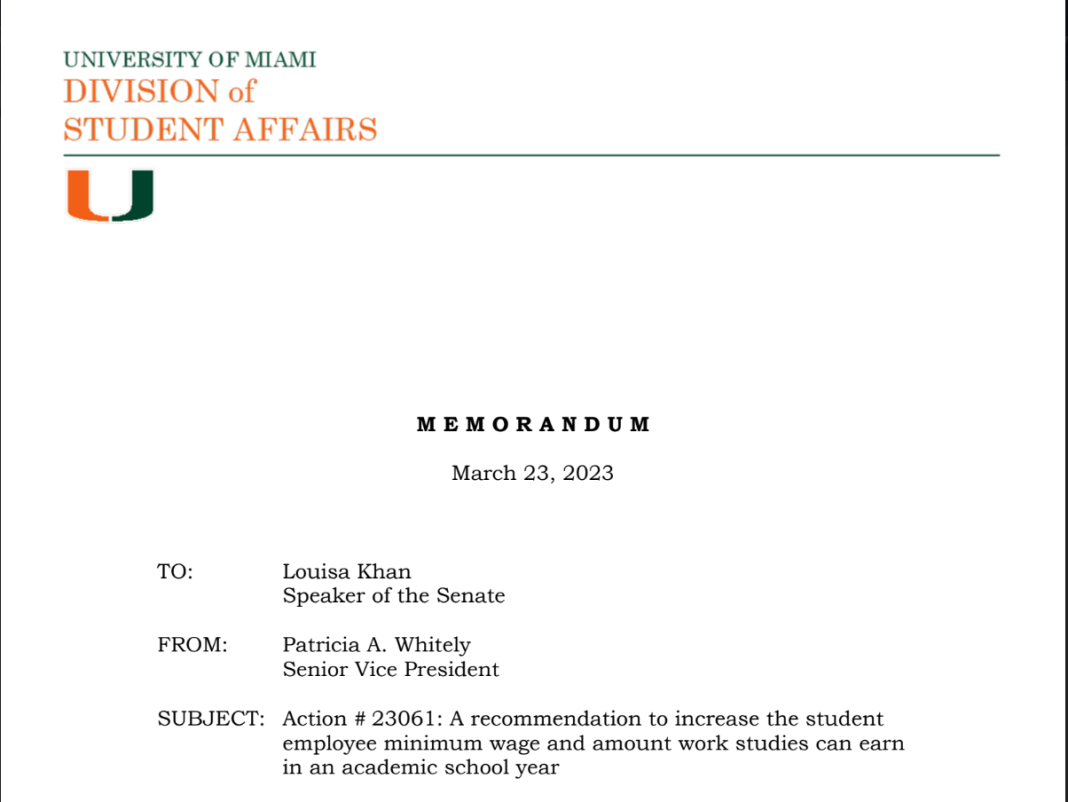In the face of America’s least affordable housing market and the debilitating price tag of a private education, some University of Miami students are struggling to make ends meet. To get by, many student’s hold on-campus jobs. These positions frequently pay just above Florida’s minimum wage. UM’s Student Government(SG) was on a mission to raise these wages, however, their efforts have been brought to a halt.
In 2020, Florida voters approved a mandate to raise the minimum wage to $15 by 2027 and now, as of Sep. 2022, Florida’s minimum wage is $11 an hour. UM’s student employees are frequently paid $11.40 an hour.
In light of this, SG recently passed a bill to increase student employee wages. However, the bill was later rejected by UM Senior Vice President of Student Affairs, Patricia Whitely.
The bill did not specify the amount by which the minimum wage for student employees should be increased, only that it should be increased “in accordance with the needs of the undergraduate student body.”
SG Student Employee Senator Angel Viola-Cruz says this was done deliberately.
“The bill was purposely made very vague,” said Viola-Cruz. “I did that in a sense, because I knew going into it a bill of this nature, and this magnitude needs to be vague in order for the university to decide how to implement it and how to go about it.”
Prior to being elected to office, Viola-Cruz ran on a platform that looked to increase student wages. The senator strongly believes that this bill would have been a critical step towards helping students afford tuition and cope with the current inflation, which is at a 40-year high and has led to a significant rise in consumer prices across the board.
“I think having an increase in minimum wage would have definitely helped alleviate that burden and kind of help facilitate that a little bit better,” said Viola-Cruz.
According to the Student Employment Office, student employees make an average of $11.40 an hour. The bill states that with the “average cost of attendance at the U set at $46,000 it would take a student who works 20 hours a week over 100 months to pay off 1 year at the U.”
In a letter responding to the bill, Whitely noted that the university currently follows the state’s minimum wage, which is $15 per hour for non-student workers, and that student wages are dictated by the Fair Labor Standards Act, a law that establishes federal minimum wage, overtime pay, recordkeeping, and youth employment standards. She also expressed concerns about the implications of the wage increase.
“Changes to student wage have larger implications on wages for regular and temporary non-student wages … It is challenging to set a standard across all departments as each area manages their own budget in accordance with central budgeting,” Whitely wrote.
Whitely emphasized that the university remains committed to fair wages for student employees. She also acknowledged the financial burden that many students face and the need to address it in a sustainable way.
The bill aimed to increase the student employee minimum wage in accordance with the needs of the undergraduate student body. It cited various reasons for the wage increase, including the high cost of living in Miami and increased tuition, as well as the need to address the housing crisis at the university.
The bill also highlighted other universities that have recently increased their minimum wage, including Pennsylvania State University, University of Virginia and Duke University. It noted that while these universities are not in Florida, they serve as examples of how universities can prioritize fair wages for their student employees.
“What we have noticed is that if another university makes a substantial change, it gives UM more of an initiative to follow suit. [UM] is always trying to find something to make us a staple, to make us more of a name brand, and to stick out from other universities,” said Viola-Cruz.
The rejection of the bill has sparked a debate about the financial challenges facing students at UM and the role of the university in addressing them. Some students feel that the university has a responsibility to ensure that its student employees are paid a fair wage that reflects the high cost of living in Miami.
Dharma Proctor, a senior studying ecosystem science and policy, works at the front desk of the pool. Proctor said she feels disheartened by the lack of initiative from administration to ensure their student employees are living comfortably in a city and on a campus with an increasingly high cost of living.
“I work hard to try to support myself here in Miami while also pursuing my education,” Proctor said. “I understand the complexities that refrain the dean from passing this bill but I also wish there could be an outline for how this issue is going to continue to be addressed.”
Viola-Cruz feels similarly.
“I think a statement released on [the division of student affairs’] behalf would be a good first step, just to show the student body that they are committed to this cause,” Viola-Cruz said. “It would show the student body that they’re committed and kind of to hold them accountable as well, because then we have kind of a trail, and we can kind of check up on it as we go.”







